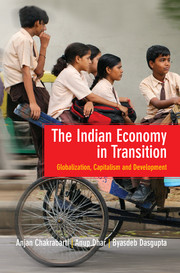Book contents
- Frontmatter
- Contents
- Preface
- Introduction
- Chapter I The Condition of the Working Class in Contemporary India
- Chapter II Capitalism: The ‘Delusive Appearance of Things’
- Chapter III Post-colonial Development and ‘The Thought of the Outside’
- Chapter IV The Word and the World of Neo-liberalism
- Chapter V The Scrypt of Transition: Between the Spectral and the Secret Thereof
- Chapter VI From Self-reliance to Neo-liberalism: The Political Economy of ‘Reform’ (1991–2014)
- Chapter VII Global Capitalism and World of the Third: The Emergent Cartography of the Indian Economy
- Chapter VIII Inclusive Development, State and Violence
- Chapter IX From Economic Crisis to Transition Crisis
- Conclusion
- Bibliography
- Author Index
- Subject Index
Chapter VII - Global Capitalism and World of the Third: The Emergent Cartography of the Indian Economy
Published online by Cambridge University Press: 18 December 2015
- Frontmatter
- Contents
- Preface
- Introduction
- Chapter I The Condition of the Working Class in Contemporary India
- Chapter II Capitalism: The ‘Delusive Appearance of Things’
- Chapter III Post-colonial Development and ‘The Thought of the Outside’
- Chapter IV The Word and the World of Neo-liberalism
- Chapter V The Scrypt of Transition: Between the Spectral and the Secret Thereof
- Chapter VI From Self-reliance to Neo-liberalism: The Political Economy of ‘Reform’ (1991–2014)
- Chapter VII Global Capitalism and World of the Third: The Emergent Cartography of the Indian Economy
- Chapter VIII Inclusive Development, State and Violence
- Chapter IX From Economic Crisis to Transition Crisis
- Conclusion
- Bibliography
- Author Index
- Subject Index
Summary
Following the birth of neo-liberal globalization in India, the erstwhile centrisms of capitalism and modernism both got reiterated–rekindled and revised–displaced. This was accompanied by the re-location of the otherwise decentred and disaggregated class focused reality into a hegemonic formation, a delusional appearance of things in the everyday, as Marx would say, that worked over and in tandem with two covalent–coeval domains: the circuits and camp of global capital, and its constitutive outside, world of the third. The relocation is also reflective of how in capitalist development the foreclosed world of the third got displaced by a substitute signifier, third world, as precapitalist and pre-modern; and how the ‘transition’ of contemporary India is scripted on the privileged centricity accorded to global capital (capitalocentrism). This reality, as we showed in Chapter 2, ‘itself initially contains a hole that the world of phantasy [and delusions] will subsequently fill; metaphorically the rent in the Lacanian Symbolic introduced by foreclosure is sutured, stitched together, closed off, provisionally through the production of a ‘delusional appearance of things’.
At a somewhat basic level, foreclosures of class, world of the third and original accumulation gives consistency to what we could call global capitalist hegemony; which is the same as what one calls global capitalism; global capitalism includes the circuits-camp of global capital, but which is more than the circuits-camp; it is the delusional cosmology that gives consistency to global capitalism through the foreclosure of these three organized in turn through the foregrounding of other substitutes. This chapter is an unpacking of the anatomy of global capitalist hegemony, and its relation with the transition story of India.
In terms of the transition story, the ‘living dead’ in this new hegemonic formation are class (process of surplus labour), world of the third (capturing a language–logic–experiencing–ethic, at times a non-capitalist praxis, at other times a post-capitalist ethic that cannot be accounted as such from with[in] the hegemonic) and original accumulation (epitomizing the assault on the inassimilable Other, where the assault is legitimized by presenting the Other either as the lacking other of the Developed or the pre-history of Capital or the archaic fossil of Tradition/Oriental Despotism).
- Type
- Chapter
- Information
- The Indian Economy in TransitionGlobalization, Capitalism and Development, pp. 225 - 288Publisher: Cambridge University PressPrint publication year: 2015



